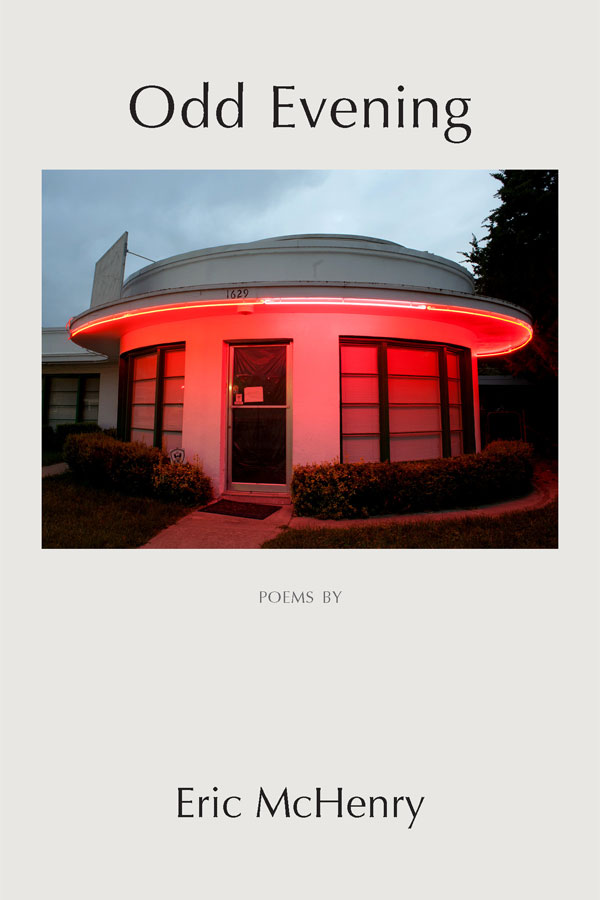Odd Evening
£9.99
In his first full-length collection in ten years, Eric McHenry brings fresh attention to his old obsessions – love, laughter, justice, transience, how humility ennobles, how time makes the familiar strange and how our scars make us beautiful. McHenry can dazzle with his technical dexterity, but his poems aren’t merely performances; in Odd Evening, music creates meaning and vice versa. If books of poetry have patron saints, Buster Keaton might be this one’s: a stoic, stone-faced everyperson who’s endlessly resourceful in the face of calamity.
Out of stock
Odd Evening
“Eric McHenry’s poems are hilarious, dark, tender, and formal. But he’s a formalist interested in the language of now and in the world we currently inhabit. And that turns his rhymes and meters into rock n roll. I love this book.” – Sherman Alexie
“To say that Eric McHenry is one of the best – and most delightful, most alive – poets of my generation isn’t enough praise. His native sense of music in English, his tonal variation, and his generosity of spirit are extraordinary. McHenry can be playful and at the same time ecstatic and practical (‘I started saying whoa whoa whoa whoa whoa. / I didn’t drop what I was holding, though’). His play is movingly traditional, yes, but also utterly modern. For this is a poet who sets today’s uncertainties and dualities to gorgeous music.” – Ilya Kaminsky
“At their brilliant outer limits, poetic form and ethical vision are indistinguishable, as Eric McHenry’s masterful poems remind us. The unforgiving injunctions of rhyme and end-stopped line refuse to euphemize, and so are particularly good at conveying the unforgiving declensions of age and envy, physical abjection, personal and institutional indifference. And, of course, poetic form this sharply rendered is also an unparalleled instrument for satire: the only bow to wickedness in these pages is wicked fun. Eric McHenry sounds like no other poet working in America today. I thank our lucky stars for his white-hot independence.” – Linda Gregerson
Reviews of Odd Evening
New Walk (Autumn/Winter 2016-2017)
McHenry is the current poet laureate of Kansas and a working knowledge of Topeka can assist interpretation of some of these pieces, but inaccessible they are not. The rhythms … can be very hard to get out of your head, so you find yourself re-reading with the book closed – like it or not but you will! … McHenry is a poet to keep an eye on, and if you haven’t been doing so already, it’s well worth going back and picking up a copy of his first collection, Potscrubber Lullabies (2006), also from Waywiser, while you’re at it.
– Philip Morre
Canes
We should entrust them only to the old.
A cane suggests authority or sport
to anyone who doesn’t need support.
A prefect who discovers he can hold
one by the shaft, or even upside-down,
will feel the verb vibrating in the noun.
A prefect is a boy. However deft
his mouth becomes at publicly explaining
the rector’s protocol for public caning,
his hand is more accustomed to the heft
and balance of a cricket bat, and trembles
to grip a cane like what it half-resembles.
A prefect may impulsively suspend
your sentence after six or seven blows
when he hears titters from the first few rows,
re-grip the cane by its unhandled end,
wait for the tremor traveling through the room
to clench into attention, and resume.
A lifetime of reliving this may leave
you oversatisfied with your own fitness
to judge events you did and didn’t witness
and unreceptive when you first receive
a crabbed apology for an unnamed
“sad incident of which I’m still ashamed.”
Push up your reading glasses and allow
bemusement to resolve, first into rage
at the translucent, single-sided page,
the fantasy that there must be, somehow,
fraternity in your respective traumas,
his near-demotion, your blood-stiff pyjamas,
then into a desire to disabuse,
then into wondering about that word,
then into bed, where you may rest assured
that any cane you dream you can refuse,
re-grip, or even raise, because your hand
is steady and you need no help to stand.
You’ll wake up feeling generous and glib
and answer him at length without rereading
his letter, and you’ll leave no letter bleeding,
applying steady pressure to the nib,
producing but not pausing to admire
the measured strokes such sentences require.
The Waywiser Press
Crying With Glasses On
It’s such a grownup thing to do.
Like renting tap shoes to perform
for no one in an electrical storm.
What’s wrong with you?
Remove your spectacles and cry,
already. If there’s rain
on your side of the windowpane
you’re probably the sky.
What’s the intention of a tear
if not to lubricate and cleanse?
I’ll tell you: a corrective lens
is making things too clear.
In college I could see the future
coming and would often
pop out my contacts first, to soften
its least attractive feature.
If you’ll just give it half an hour,
grief will discover
you drawing steam-roses in the shower,
and join you, like a lover.
The Waywiser Press
Randy Used the Wordhttps://waywiser-press.com/waywiser/wp-content/uploads/RandyUsedTheWord.m4a
Excerpts
Canes
We should entrust them only to the old.
A cane suggests authority or sport
to anyone who doesn’t need support.
A prefect who discovers he can hold
one by the shaft, or even upside-down,
will feel the verb vibrating in the noun.
A prefect is a boy. However deft
his mouth becomes at publicly explaining
the rector’s protocol for public caning,
his hand is more accustomed to the heft
and balance of a cricket bat, and trembles
to grip a cane like what it half-resembles.
A prefect may impulsively suspend
your sentence after six or seven blows
when he hears titters from the first few rows,
re-grip the cane by its unhandled end,
wait for the tremor traveling through the room
to clench into attention, and resume.
A lifetime of reliving this may leave
you oversatisfied with your own fitness
to judge events you did and didn’t witness
and unreceptive when you first receive
a crabbed apology for an unnamed
“sad incident of which I’m still ashamed.”
Push up your reading glasses and allow
bemusement to resolve, first into rage
at the translucent, single-sided page,
the fantasy that there must be, somehow,
fraternity in your respective traumas,
his near-demotion, your blood-stiff pyjamas,
then into a desire to disabuse,
then into wondering about that word,
then into bed, where you may rest assured
that any cane you dream you can refuse,
re-grip, or even raise, because your hand
is steady and you need no help to stand.
You’ll wake up feeling generous and glib
and answer him at length without rereading
his letter, and you’ll leave no letter bleeding,
applying steady pressure to the nib,
producing but not pausing to admire
the measured strokes such sentences require.
The Waywiser Press
Crying With Glasses On
It’s such a grownup thing to do.
Like renting tap shoes to perform
for no one in an electrical storm.
What’s wrong with you?
Remove your spectacles and cry,
already. If there’s rain
on your side of the windowpane
you’re probably the sky.
What’s the intention of a tear
if not to lubricate and cleanse?
I’ll tell you: a corrective lens
is making things too clear.
In college I could see the future
coming and would often
pop out my contacts first, to soften
its least attractive feature.
If you’ll just give it half an hour,
grief will discover
you drawing steam-roses in the shower,
and join you, like a lover.
The Waywiser Press





